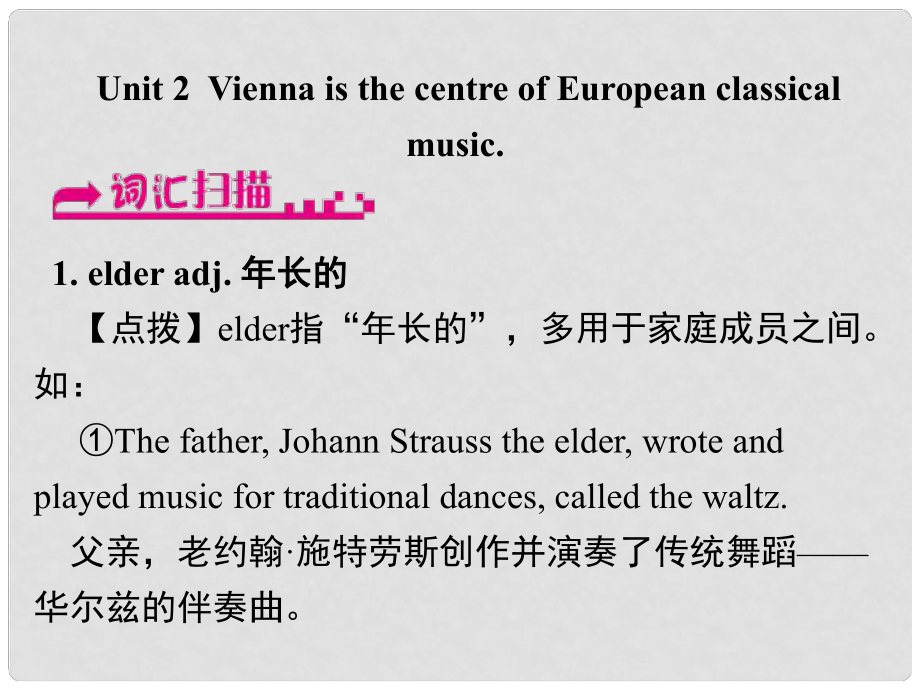《浙江省嘉興市秀洲區(qū)七年級英語下冊 Module 12 Western music Unit 2 Vienna is the centre of European classical music課件 (新版)外研版》由會員分享���,可在線閱讀����,更多相關(guān)《浙江省嘉興市秀洲區(qū)七年級英語下冊 Module 12 Western music Unit 2 Vienna is the centre of European classical music課件 (新版)外研版(17頁珍藏版)》請在裝配圖網(wǎng)上搜索���。
1��、Unit 2 Vienna is the centre of European classical music. 1. elder adj. 年長的年長的 【點撥】elder指“年長的”���,多用于家庭成員之間。如: The father, Johann Strauss the elder, wrote and played music for traditional dances, called the waltz. 父親�,老約翰施特勞斯創(chuàng)作并演奏了傳統(tǒng)舞蹈華爾茲的伴奏曲。He has an elder brother.他有一位哥哥?�!颈嫖觥縠lder與olderelder 只用于指人��,多指兄弟
2��、姐妹之間年紀較長的����。只用作定語,不用作表語�,也不能與than連用。如:His elder sister went to Canada last year.他姐姐去年去了加拿大����。older 是old的比較級形式,可用于指人或物���。指人時��,指實際年齡較大的�����;指物時�����,意為“較舊的”��。該詞既可以作定語�、表語�����,也可與than連用����。如:I am two years older than my brother.我比我弟弟大兩歲。This book is older than that one.這本書比那本舊���。 【注意】elder還可用作名詞���,其復數(shù)形式泛指“長輩”;而older沒有這種用法��。如: Childr
3�����、en should respect their elders. 孩子們應(yīng)該尊敬長輩。2. European adj. 歐洲的歐洲的【點撥】European作定語修飾可數(shù)名詞單數(shù)時���,雖然European以元音字母E開頭����,但它的第一個音素/j/是一個輔音��,所以該詞前不定冠詞用a而不是an���。一定要記住�����,決定用a還是an��,不是由開頭的字母決定�,而是由開頭字母的發(fā)音決定的�。如: a useful book一本有用的書 an hour一小時 3. eighteenth num. 第十八第十八 【點撥】eighteenth是序數(shù)詞,相對應(yīng)的基數(shù)詞為eighteen�����。序數(shù)詞表示順序���,前面通常會加定冠詞“the
4��、”�����,但當前面有其他修飾詞時�,則不加the��。如:Usually he is the first student to get to school every morning. 通常他是每天早上第一個到校的學生�����。 Its my second bike. 這是我的第二輛自行車��。 Tomorrow is Damings eighteenth birthday. 明天是大明的十八歲生日���。 【延伸】序數(shù)詞的書寫有一定的規(guī)律��,通常在相對應(yīng)的基數(shù)詞之后加上“th”而構(gòu)成�����。如:sixth第六���。也有一些例外��,如:third第三��。 第1第10:first, second, third, fourth, fifth,
5�����、 sixth, seventh, eighth, ninth, tenth 第11第20:eleventh, twelfth, thirteenth,fourteenth, fifteenth, sixteenth, seventeenth, eigh-teenth, nineteenth, twentieth 第21第29:twenty-first, twenty-second,twenty-third, twenty-fourth, twenty-fifth, twenty-sixth, twenty-seventh, twenty-eighth, twenty-ninththirtiet
6����、h第30����,fortieth第40,fiftieth第50���,sixtieth第60��,seventieth第70�,eightieth第80�����,ninetieth第90,one hundredth第100���。記憶口訣:記憶口訣:基變序�,有規(guī)律�,詞尾加上-th。一����,二��,三�,特殊記,詞尾字母t�,d,d����。八去t,九除e���,ve要用f替�,ty將y變成i���,th前面有個e����。若是碰到幾十幾,前用基來后用序����。 4. another pron. 又一個;再一個又一個��;再一個 【點撥】another用作代詞�,意為“又一個;再一個”�����。如: I dont like this one. Could you show me anot
7��、her? 我不喜歡這個�����。再給我拿一個好嗎�����? 【延伸】(1)another還可用作形容詞,意為“再一的����;又一的”。用于單數(shù)可數(shù)名詞前�����,且名詞前不用冠詞�、物主代詞、指示代詞等��。如: It will take me another week to finish the work. 我還需要一個星期的時間來完成這項工作���。 (2)another也可用于“數(shù)詞+名詞的復數(shù)形式”前。如: Lets wait another five minutes. 咱們再等5分鐘吧�。 5. poor adj. 貧窮的貧窮的 【點撥】be poor in意為“在方面貧乏”,其反義詞組為be rich in.�����,意為“在方面富
8�、有”。如: The country is poor in resources. 這個國家資源貧乏����。 【延伸】the poor意為“窮人”�����,作主語時��,當作復數(shù)看待��。如: The poor are not always sad. 窮人并不總是傷心�����。 1. His dance music made him famous all over Europe. 他的舞曲使他聞名于全歐洲���。他的舞曲使他聞名于全歐洲。 【點撥】make在該句中用作使役動詞��,此時它的用法主要有以下兩種:(1)make sb./sth. do sth.意為“使某人/物做某事”���;(2)make sb./sth.+adj.意為“使某人/
9�����、物”��。如: The music made us relaxed. 音樂使我們感到放松�����。 The boss made him work for 12 hours. 老板讓他工作了12個小時����。 (3)make sb.+名詞(短語),意為“使成為”�。如: That book made him a famous man. 那本書使他成了名人。(4)make的相關(guān)短語有很多���,如:make a mistake犯錯誤��;make noise制造噪音���;make a shopping list寫一個購物單��;make a telephone call打電話�;make friends with與交朋友;make a
10�����、face做鬼臉;make a living謀生�����,維持生活��;make fun of取笑��,嘲笑�;make money賺錢;make ones bed鋪床���,收拾床鋪�;make sure確信�,務(wù)必,弄清楚�����;make up彌補��,構(gòu)成���,編造��;make.into把變成��;be made of.由制成�;be made from.由制成;be made up of.由組成��。 2. Before he was six, he played not only the piano but also the violin. 還不到六歲時��,他就既會彈鋼琴��,又會拉小提琴��。還不到六歲時��,他就既會彈鋼琴�����,又會拉小提琴�。 【點撥】
11、(1)該句中的短語not only.but also.意為“不但而且”�,該短語連接的并列成分要保持一致��。另外該短語在連接并列主語時,謂語動詞的數(shù)應(yīng)與其鄰近主語的數(shù)保持一致��,即遵循就近原則�。如: Not only you but also she likes traditional Western music. 不但你喜歡西方傳統(tǒng)音樂,而且她也喜歡�。 (2)Before he was six是before引導的時間狀語從句,其中before是連詞����,意為“(時間)在之前”。如: Please let me know before you go. 在你走之前�����,請讓我知道�。 【延伸】延伸】before的詞性和含義還有的詞性和含義還有:詞性含義例句介詞在之前(順序)Those with babies get on the bus before others. 懷抱嬰兒的乘客比別人先上公交車。副詞以前I have seen the film before.我以前看過這部電影��。
 浙江省嘉興市秀洲區(qū)七年級英語下冊 Module 12 Western music Unit 2 Vienna is the centre of European classical music課件 (新版)外研版
浙江省嘉興市秀洲區(qū)七年級英語下冊 Module 12 Western music Unit 2 Vienna is the centre of European classical music課件 (新版)外研版

